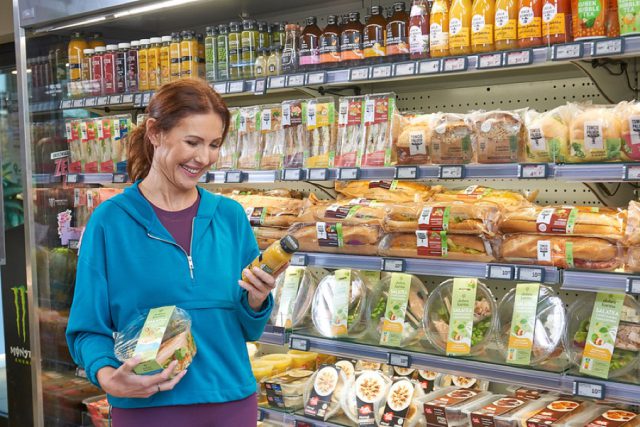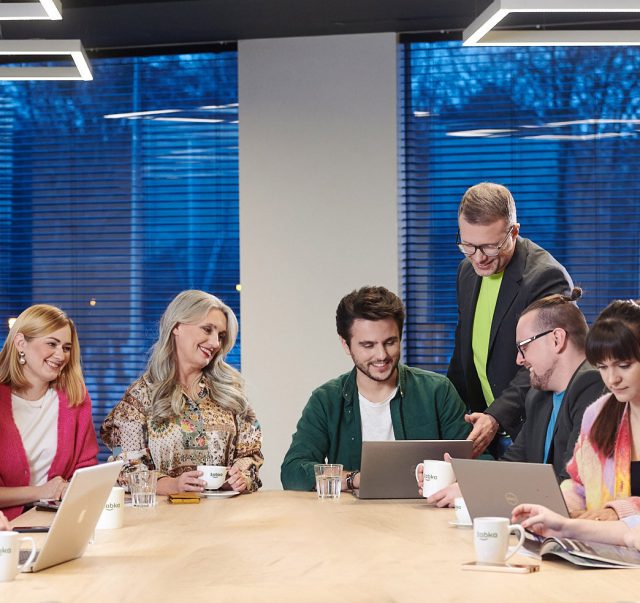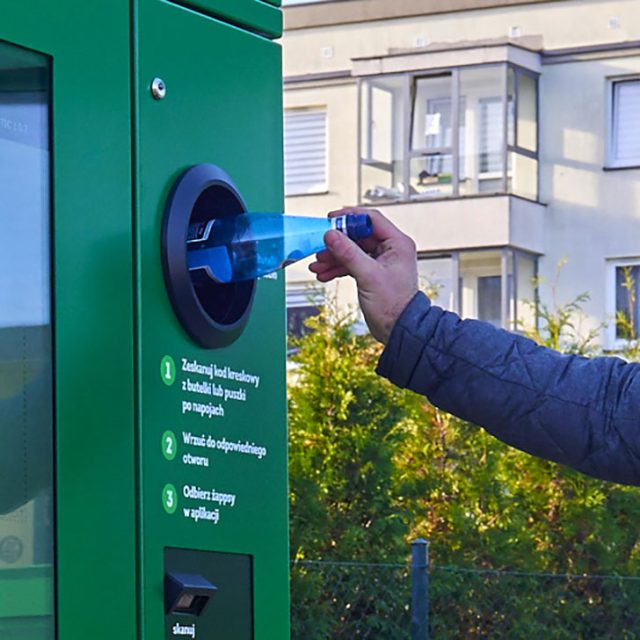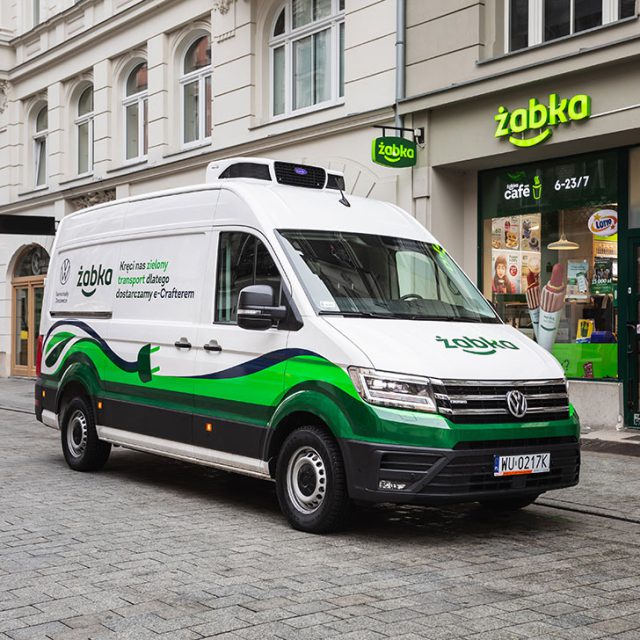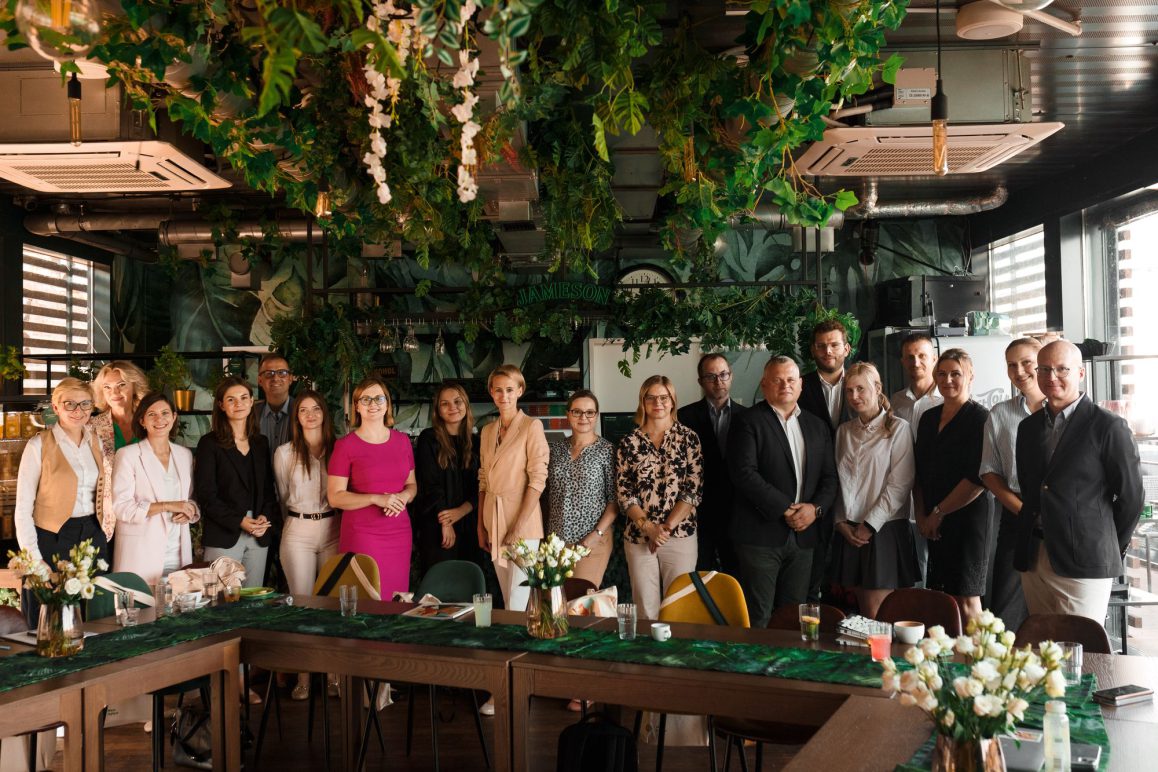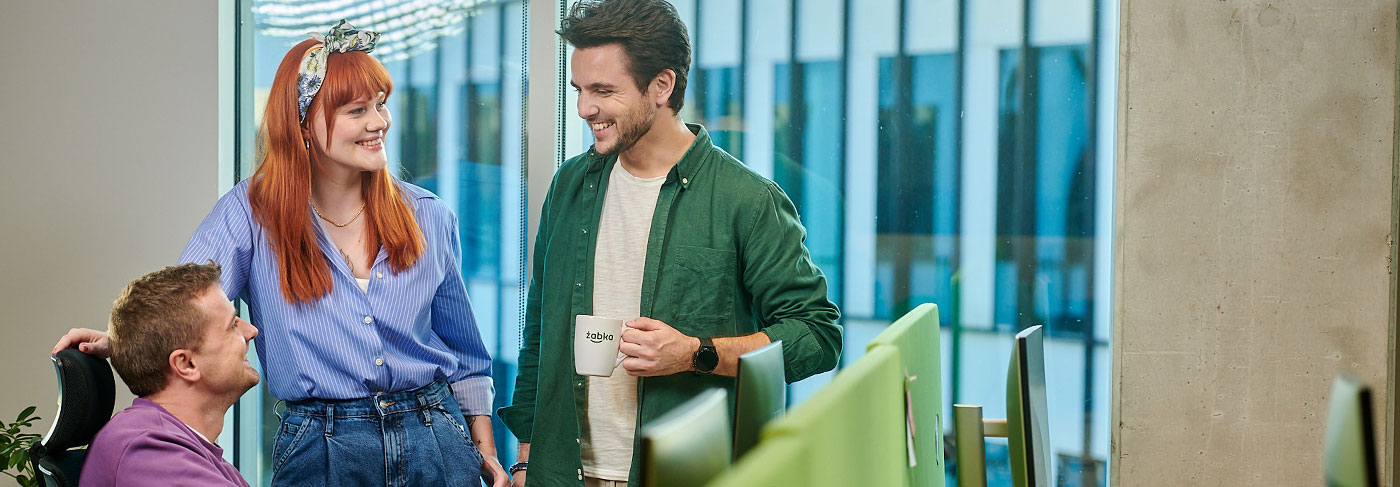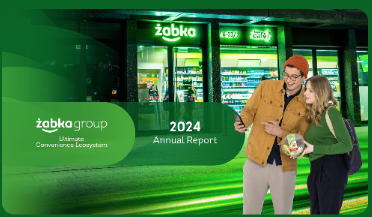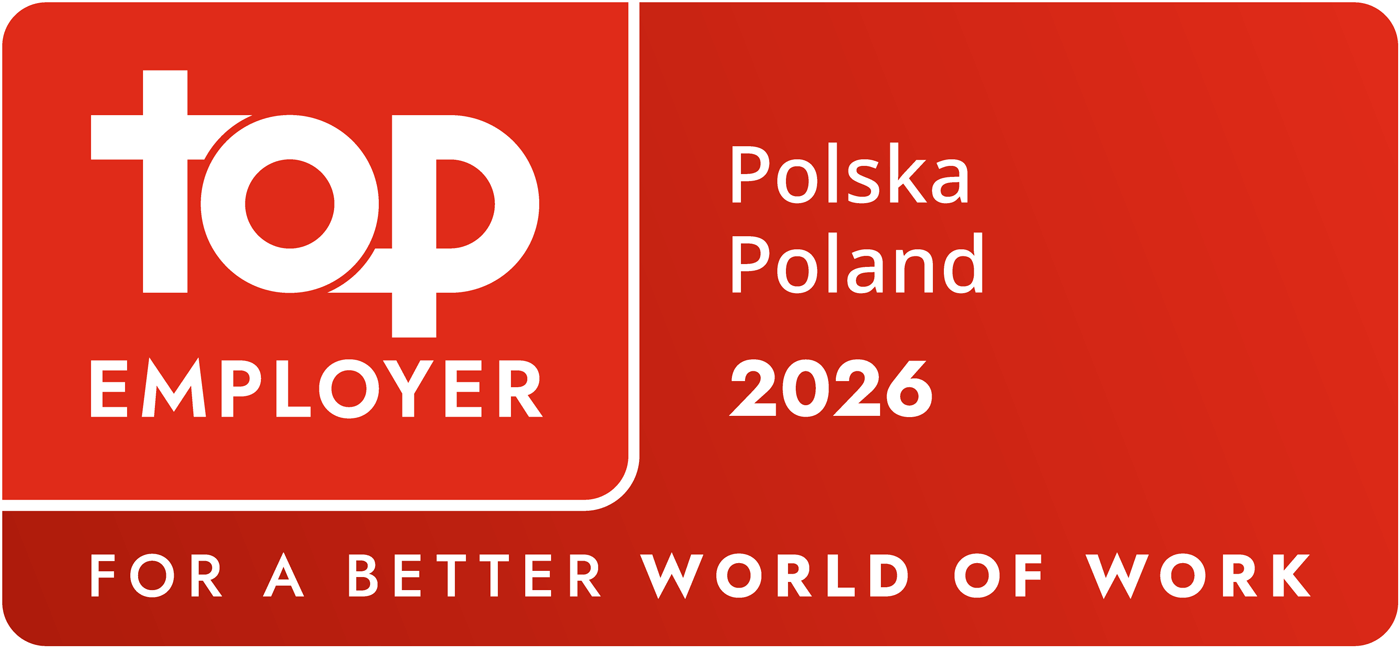Co możemy wspólnie ulepszyć
Co nowego
Razem z partnerami biznesowymi dla zrównoważonego rozwoju - fair business brunch
Skuteczne rozwijanie współpracy z naszymi partnerami biznesowymi jest możliwe dzięki dzieleniu się wiedzą i wzajemnemu inspirowaniu się. Dlatego zorganizowaliśmy pierwszy fair business brunch – spotkanie w ramach platformy czysty biznes – tworząc tym samym przestrzeń do wymiany dobrych praktyk oraz dyskusji o wspólnych wyzwaniach w kameralnym gronie naszych partnerów biznesowych.
W kontekście dekarbonizacji współpraca ma wyjątkowe znaczenie, a w szczególności, gdy mowa o redukcji emisji zakresu 3. W Żabce, poza celem obniżenia intensywności emisji gazów cieplarnianych w sklepach w zakresie 3 o 70% (rok bazowy 2020), dążymy też do włączenia naszych partnerów biznesowych w walkę ze zmianami klimatycznymi. Chcemy zaangażować 75% z nich w ustalenie naukowo potwierdzonych celów dekarbonizacyjnych. Dlatego poprosiliśmy ekspertów z firm, z którymi współpracujemy na co dzień i przedstawicieli Żabki o zaprezentowanie dobrych praktyk i inspiracji z obszaru dekarbonizacji. Swoimi doświadczeniami podzielili się z zaproszonym gronem przedstawiciele firm Microsoft, Carlsberg, Stock Spirits oraz Maspex.

Tematyka spotkania koncentrowała się na dekarbonizacji, jednak kwestie etycznego i zrównoważonego łańcucha dostaw również towarzyszył dyskusjom. W tym kontekście szczególną uwagę poświęcono Kodeksowi Postępowania dla Partnerów Biznesowych Żabka Polska oraz Polityce Praw Człowieka dla Partnerów Biznesowych. Dążymy do 100% zgodności naszych partnerów z pierwszym z powyższych dokumentów do 2026 roku. By osiągnąć ten ambitny cel oferujemy naszym dostawcom wsparcie merytoryczne, a także rekomendujemy im poddawanie się audytom etycznym. Dzięki spójności z naszym Kodeksem możemy mieć pewność, że nasi partnerzy również tworzą wartość w sposób zrównoważony i z troską o planetę.
Wierzymy, że rozwijanie dalszej współpracy oraz łączenie sił z naszymi partnerami pozwoli nam wspólnie tworzyć czysty biznes!
GS1 DataMatrix – Nowa generacja kodów kreskowych napędzająca innowacje w sklepach Żabka

Żabka od dawna jest pionierem w zakresie nowych technologii kodów kreskowych, oferując korzyści takie jak zapewnienie świeżości produktów, wspieranie bezpieczeństwa konsumentów, usprawnienie zarządzania zapasami oraz dostarczanie informacji, których oczekują klienci.
W 2024 roku zrobiliśmy znaczący krok naprzód, stając się pierwszym polskim detalistą, który wdrożył zaawansowany GS1 DataMatrix – nowoczesny dwuwymiarowy kod kreskowy przypominający kod QR. Co istotne, zapewnia on wyjątkową pojemność danych w bardzo małym formacie, oferując znaczące przewagi nad swoimi jednowymiarowymi poprzednikami.
Jak podkreśla Marta Urbaniak, Dyrektor Działu Zarządzania Jakością i Środowiskiem w Żabce: „To rozwiązanie bazuje na pracach, które rozpoczęliśmy już w 2018 roku, kiedy po raz pierwszy współpracowaliśmy z wiodącym słowackim producentem kanapek Pierre Baguette, aby wprowadzić technologię jednowymiarowych kodów GS1.”
„Pierwsze wdrożenie przyniosło natychmiastowe usprawnienia w zakresie efektywności i zarządzania zapasami, a także stało się dla nas źródłem ciągłego doskonalenia, na którym koncentrujemy się do dziś. Nie było jednak idealne – na przykład w niektórych sklepach i magazynach występowały problemy ze skanowaniem kodów, zwłaszcza na zakrzywionych powierzchniach opakowań.”
To uwidoczniło potrzebę jeszcze bardziej zaawansowanego, wszechstronnego kodu kreskowego, który mógłby pomieścić więcej danych. GS1 DataMatrix szybko okazał się idealnym wyborem do dalszych prac.
Dlatego w ciągu ostatnich dwóch lat firma intensywnie pracowała nad wdrożeniem, współpracując z Nowalijką – wiodącą polską firmą dostarczającą dania gotowe dla Żabki. W efekcie obie firmy skutecznie zoptymalizowały rozmiar kodu, czyniąc go na tyle kompaktowym, by można go było stosować na małych i zakrzywionych opakowaniach świeżych produktów.
„Jesteśmy oczywiście bardzo zadowoleni, że udało nam się stworzyć bardziej kompaktowy kod, który spełnia globalne standardy handlu detalicznego” – kontynuuje Marta Urbaniak. „Ale nie chodzi tylko o kompaktowość. Inne korzyści to usprawnione uzupełnianie zapasów i zarządzania brakami produktowymi, lepsza synchronizacja danych, większa dokładność skanowania i zarządzanie terminem przydatności, a także usprawnione dostawy. Dzięki temu wiemy, kiedy obniżyć cenę produktów i mamy pewność, że nic nie zostanie sprzedane po upływie terminu ważności – to kluczowy aspekt bezpieczeństwa klientów, który dodatkowo pomaga ograniczyć marnowanie żywności.”
Obecnie ponad 12 000 sklepów Żabka obsługuje kody GS1 DataMatrix, co plasuje firmę w czołówce zmian. To znacznie wyprzedza cele wyznaczone dla globalnego sektora handlu detalicznego, zakładające, że wszystkie systemy kasowe muszą być zdolne do odczytu i obsługi kodów 2D do końca 2027 roku.
Współpraca Żabki z Nowalijką została również wyróżniona nagrodą na konferencji KOD Innowacji, a firma nadal ściśle współpracuje z Instytutem GS1, spotykając się co kwartał w ramach Grupy Roboczej GS1.
Jak podkreśla Marta Urbaniak: „Szczególnie cieszy mnie fakt, że wdrożyliśmy GS1 u około 80% naszych dostawców produktów chłodzonych marek własnych, obejmując ponad 120 produktów własnych. Teraz koncentrujemy się na kolejnym etapie rozwoju tej technologii – w szczególności na testowaniu kodów GS1 DigitalLink, które dodatkowo usprawnią komunikację z klientem, przekierowując go na stronę internetową.”
Centrum Logistyczne Radzymin uzyskało certyfikację
BREEAM In-Use
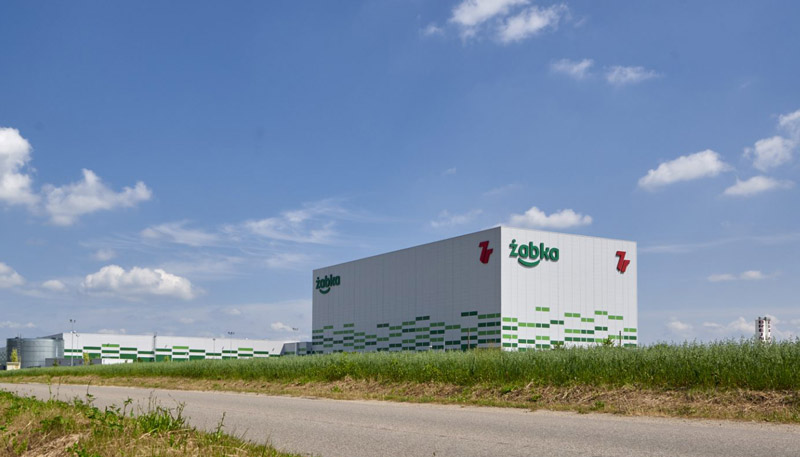
Zrównoważony rozwój to dla Żabki nie tylko hasło, ale realne zobowiązanie. W naszej Strategii Odpowiedzialności staramy się uwzględniać każdy aspekt działalności firmy, również zrównoważone podejście do naszego portfolio nieruchomości. Dążymy do tego, by budynki były efektywnie zarządzane, przyjazne użytkownikom i miały niski wpływ na środowisko. Po sukcesie certyfikacji BREEAM New Construction uzyskanej na etapie projektowania i budowy Centrum Logistycznego w Radzyminie, postawiliśmy sobie kolejne ambitne wyzwanie: potwierdzić, że również w codziennej eksploatacji utrzymujemy najwyższe standardy środowiskowe i technologiczne.
Certyfikat BREEAM In-Use to międzynarodowy dowód na to, że budynek jest zarządzany w sposób odpowiedzialny i zgodny z najlepszymi praktykami. Chcieliśmy pokazać, że nasze centrum logistyczne nie tylko zostało zaprojektowane z uwzględnieniem jego wpływu na środowisko, ale także funkcjonuje tak, aby minimalizować ten wpływ i zapewniać komfort użytkownikom. To naturalna „ścieżka życia budynku”: od dobrego projektu do równie dobrego zarządzania.
Od audytu do sukcesu – kulisy certyfikacji
BREEAM (Building Research Establishment Environmental Assessment Method) to międzynarodowy system oceny budynków pod kątem ich wpływu na środowisko, komfortu użytkowników oraz efektywności zarządzania. Wariant In-Use dotyczy obiektów już funkcjonujących i sprawdza, jak są one użytkowane, utrzymywane i modernizowane na co dzień.
Proces certyfikacji BREEAM In-Use obejmuje dwa kluczowe obszary:
• Asset Performance – czyli fizyczne cechy budynku, jego konstrukcja i instalacje.
• Building Management – sposób zarządzania, procedury, konserwacja i monitoring.
Audyt był szczegółowy: analizowano efektywność systemów HVAC, zużycie energii i wody, gospodarkę odpadami, wpływ na bioróżnorodność, jakość powietrza, akustykę, bezpieczeństwo, a nawet dostępność i udogodnienia dla użytkowników. Ponadto, wymagania BREEAM obejmują również przeprowadzenie analizy ryzyk fizycznych związanych ze zmianami klimatu, ryzyk przejścia na gospodarkę niskoemisyjną oraz ryzyk społecznych. To nie był jednorazowy wysiłek – aby utrzymać i podnosić poziom naszego budynku w kolejnych latach będziemy wdrażać lub utrzymywać liczne inicjatywy, takie jak regularne przeglądy inteligentnych systemów zarządzania budynkiem (BMS), programy oszczędzania wody, segregację odpadów i inicjatywy prośrodowiskowe: zielone nasadzenia wspierające bioróżnorodność oraz monitoring jakości powietrza. Ważną rolę odgrywa również edukacja i komunikacja z pracownikami, bo zależy nam na budowaniu ich świadomości, że ich codzienne działania niosą za sobą wpływ na środowisko.
Korzyści, które odczują wszyscy – od środowiska po biznes
Efekt? Centrum Logistyczne w Radzyminie uzyskało certyfikat BREEAM In-Use na poziomie Excellent – jeden z najbardziej prestiżowych standardów oceny zrównoważonych budynków w fazie eksploatacji. To nie tylko potwierdzenie, że nasza Strategia Odpowiedzialności działa w praktyce, korzyści z uzyskania certyfikacji są wielowymiarowe:
• Środowiskowe – niższe zużycie energii i wody, lepsza gospodarka odpadami.
• Biznesowe – niższe koszty operacyjne, wyższy komfort pracy, większa wartość nieruchomości.
• Strategiczne – przewaga konkurencyjna i realne wsparcie celów ESG, w tym redukcji emisji.
Jak podkreśla Łukasz Wierski, Dyrektor Techniczny Żabki, “Z perspektywy osoby odpowiedzialnej za obszar techniczny w naszej organizacji, szczególnie doceniam, jak wymagającym i jednocześnie rozwojowym procesem jest certyfikacja BREEAM In-Use. To potwierdzenie, że konsekwentne decyzje techniczne, nadzór operacyjny i dbałość o efektywność budynku przekładają się na realne wyniki. Certyfikacja wzmacnia kierunek, w którym pracujemy – nowoczesne, bezpieczne i zrównoważone obiekty, przygotowane na przyszłe wyzwania.”
Odczarowujemy dania gotowe z Hilton Foods
Każdego dnia w Żabce odbywa się ponad 4,1 miliona transakcji, a my czujemy się odpowiedzialni za wspieranie naszych klientów w budowaniu dobrych i zrównoważonych nawyków żywieniowych. Dlatego w ramach inicjatywy „Porcja DobreGO!” współpracujemy z zaufanymi dostawcami, takimi jak Hilton Foods, by razem tworzyć smaczne, pożywne, wysokiej jakości dania gotowe.
Jak podkreśla Jakub Malec, Sustainable Food Manager Żabki: „Nasze działania z zespołem Hilton Foods mają wyjątkowy charakter. Naszym wspólnym priorytetem jest zapewnienie klientom łatwego dostępu do zbilansowanych posiłków na każdą porę dnia, a dzięki bliskiej współpracy możemy robić to jeszcze skuteczniej. Wspólnie z zespołem Hilton Foods koncentrujemy się na opracowywaniu nowych receptur, ale też udoskonalaniu obecnych, tak by lepiej odpowiadały na potrzeby współczesnych konsumentów”.
Regularnie organizowane warsztaty z udziałem ekspertów Żabki ds. żywienia, zespołu NPD, odpowiedzialnego za rozwój nowych produktów oraz przedstawicieli Hilton Foods, pozwala opracowywać innowacyjne dania gotowe w oparciu o wiedzę specjalistyczną i najwyższe standardy jakości. Proces ten obejmuje wybór składników, projektowanie etapów produkcji, testy kuchenne i produkcyjne, panele sensoryczne i wyliczanie wartości odżywczych.
Równolegle z pracami nad nowościami, wspólnie z Hilton Foods prowadzimy intensywne działania reformulacyjne, których celem jest poprawa receptury produktów już dostępnych w naszej ofercie. Dążymy do tego, by nasze dania osiągały jak najwyższe oznaczenie w skali Nutri-Score i spełniały kryteria czystej etykiety. Hilton Foods wspiera nas również w tym, by składniki, z których powstają nasze posiłki, posiadały odpowiednie certyfikaty, zgodne z naszymi politykami jakościowymi i zrównoważonego rozwoju.
Ważnym aspektem naszej współpracy jest także zarządzanie zapasami i przeciwdziałanie marnowaniu żywności. Dzięki ścisłej koordynacji we współpracy z Hilton Foods możemy lepiej planować zamówienia i dostosowywać produkcję do realnego zapotrzebowania, minimalizując straty.
Właśnie dzięki takim partnerstwom możemy realizować naszą misję – promowanie zrównoważonego stylu życia dla każdego i na co dzień.
Dowiedz się więcej o SBTi

Żabka Polska jest pierwszą firmą w Polsce, której cele dotyczące redukcji gazów cieplarnianych zostały zwalidowane przez Science Based Targets Initiative. SBTi jest wspólną, międzynarodowa inicjatywa CDP (dawniej Carbon Disclosure Project), Global Compact Organizacji Narodów Zjednoczonych, World Resources Institute (WRI) oraz WWF (World Wildlife Fund).
Jaka jest rola SBTi?
SBTi pomaga firmom określić, jak dużo i jak szybko muszą zmniejszyć swoje emisje gazów cieplarnianych, aby być zgodnym z wymaganiami najnowszych badań klimatycznych. Celem nadrzędnym organizacji jest ograniczenie globalnego ocieplenia do 1,5 stopnia Celsjusza powyżej poziomów przedindustrialnych, zgodnie z Porozumieniem Paryskim z 2015 roku.
Dlaczego warto przystąpić do SBTi?
Zatwierdzenie strategii dekarbonizacynej przez SBTi jest bardzo szanowanym zobowiązaniem w biznesie i zabiegają o nie wszystkie firmy chcące być liderem zrównoważonego rozwoju w swojej branży. Jako firma chcąca minimalizować swój negatywny wpływ na środowisko, nieustannie poszukujemy rozwiązań, które nam na to pozwolą i zarazem będą przeciwdziałać zmianom klimatu – pracujemy nad zmniejszeniem zużycia energii, poszukujemy nisko- i zeroemisyjnych źródeł energii, testujemy innowacyjne zielone technologie oraz zachęcamy naszych konsumentów do dokonywania przyjaznych Planecie wyborów.
Jak wygląda proces aplikacji do SBTi?
- Zobowiązanie – złożenie listu deklarującego zamiar wyznaczenia celu opartego o wiedzę naukową w ciągu 2 lat od wysłania zobowiązania;
- Utworzenie strategii dekarbonizacji – zgodnie z kryteriami SBTi;
- Weryfikacja – złożenie aplikacji i walidacja celu przez SBTi;
- Komunikacja – publiczne ogłoszenie celów i poinformowanie interesariuszy;
- Ujawnianie – coroczna publikacja emisji organizacji oraz progres do osiągnięcia celów.
Jakie są dalsze kroki po walidacji celów?
Oprócz pracy nad realizacją strategii i spełnieniu celów, należy monitorować wymagania SBTi, ponieważ ulegają regularnej aktualizacji i rozszerzeniu. Przykłady istotnych zmian w kryteriach:
- Zmiana minimalnej ambicji celów z “well below 2°C” do 1,5°C co w rezultacie oznacza między innymi zwiększenie minimalnej rocznej redukcji emisji z zakresu 1 i 2 do 4,2% rocznie;
- Włączenie emisji z grupy FLAG (Forest, Land and Agriculture) do zakresu raportowania.
Istotne zmiany w sposobie raportowania emisji organizacji również należy skonfrontować z wytycznymi SBTi, gdyż mogą one wpłynąć na status akceptacji celów:
- Zmiana alokacji grupy emisyjnej do innego zakresu;
- Zmiany kontroli operacyjnej wewnątrz organizacji.
Realizacja strategii dekarbonizacji w 2023 roku
Strategia Odpowiedzialności Grupy Żabka nakreśla nasze aspiracje i ścieżki rozwoju w sektorze ESG. Wypełnianie przyjętych zobowiązań wymaga wsparcia wszystkich naszych pracowników i partnerów. Wspólne poświęcenie pozwoliło nam skutecznie stawić czoła wyzwaniom minionego roku, a także wykorzystać liczne możliwości. Naszymi codziennymi działaniami zbliżamy się do realizacji ambicji zawartych w Strategii Odpowiedzialności Grupy Żabka. Wyniki, w stosunku do celów na 2023 r. prezentują się następująco:
Cel zakresu 1 i 2
Łączna emisja gazów cieplarnianych z zakresu 1 i 2 wyniosła 17 282 ton CO2e, co daje najwyższy dostępny wynik KPI. Dzięki dalszym inwestycjom w naszą flotę, w tym wymianę pojazdów oraz wdrożeniu programu motywacyjnego dla kierowców, utrzymaliśmy emisje w tym obszarze na poziomie z ubiegłego roku. Stało się tak pomimo wzrostu liczby samochodów. Nasze wysiłki w ciągu ostatnich dwóch lat mające na celu zminimalizowanie wycieków w systemach chłodniczych w naszych centrach dystrybucyjnych oraz zastąpienie czynników chłodniczych o wysokim potencjale tworzenia efektu cieplarnianego (GWP) czynnikami o niższym współczynniku GWP również przyczyniły się do zmniejszenia emisji. Ponadto kontynuowaliśmy nasze podejście polegające na dostarczaniu w 100% odnawialnej energii elektrycznej w operacjach własnych, wykorzystując gwarancje pochodzenia energii odnawialnej (REGO), aby wykazać, że została ona wytworzona ze źródeł odnawialnych. Korzystając z floty pojazdów chłodniczych, ograniczyliśmy również wykorzystanie suchego lodu w transporcie. W związku z tym, nasze emisje z zakresu 1 i 2 zmniejszyły się o 28,8% w porównaniu z poziomem bazowym z 2020 roku.
Cel zakresu 3 (downstream)
W zakresie 3 nadal koncentrujemy się na inicjatywach związanych z efektywnością energetyczną. Zastosowaliśmy zamknięte systemy chłodnicze do napojów w prawie 1,200 nowych sklepach i zero heating doors w blisko 2,000 sklepach. Oba rozwiązania są standardem w nowo otwieranych sklepach. Dodatkowo zadbaliśmy o to, aby 46% energii elektrycznej zużywanej w sklepach pochodziło ze źródeł odnawialnych, nie tylko poprzez zakup gwarancji pochodzenia, ale także poprzez zainstalowanie kolejnych 100 instalacji PV na dachach naszych sklepów. W efekcie intensywność emisji z zakresu 3 ze sklepów naszych franczyzobiorców spadła o 60% w stosunku do roku bazowego 2020.
Cel zakresu 3 (upstream)
Jeśli chodzi o emisje z zakresu 3 upstream, firma ściśle współpracuje ze swoimi partnerami biznesowymi w celu analizy śladu węglowego ich łańcucha dostaw w ramach różnych kategorii i stale przegląda bazę danych, aby obliczyć ich poziom zaangażowania w dekarbonizację. Strategia firmy zakłada, że do 2026 r. 75% jej dostawców pod względem wydatków, obejmujących zakupione towary i usługi, będzie miało cele oparte na podstawach naukowych.
Kooperacja na rzecz innowacji - RELOOPED
W Żabce stale poszukujemy innowacji i technologii, które będą pozwalały tworzyć rozwiązania wygodne i odpowiedzialne. Z tego powodu z radością dołączyliśmy do szeroko zakrojonej współpracy, w której udział biorą nie tylko komercyjne przedsiębiorstwa, ale również instytucje naukowe. Naszym wspólnym celem jest wypracowanie innowacyjnych rozwiązań, które będą służyły zarówno naszym klientom, jak i planecie.
W ramach naszego zaangażowania w projekt RETAIL RELOOPED, zarządzany przez BOFA, aktywnie współpracujemy z partnerami z różnych sektorów - od handlu detalicznego, poprzez przemysł odpadowy, aż po naukę. Dążymy do stworzenia opakowań do żywności, które będą nie tylko funkcjonalne, ale także przyjazne dla środowiska.
Ta międzynarodowa inicjatywa, wspierana funduszami z unijnego programu Interreg South Baltic, pozwala nam na aktywne działanie na rzecz opracowania nowych, zrównoważonych rozwiązań. Dzięki zaangażowaniu instytucji przemysłu odpadowego, świata nauki, ale też sieci handlu detalicznego, takich jak Żabka, możliwe jest przetestowanie innowacyjnych rozwiązań cyrkularnych na wielu płaszczyznach, również z aktywnym udziałem użytkowników. Jako partner wspierający, będziemy angażować naszych klientów w testowanie innowacyjnych opakowań w wybranych sklepach sieci, które pełnią rolę "living labs".
Nasze zaangażowanie w projekt RELOOPED nie tylko podkreśla naszą innowacyjność, ale przede wszystkim stanowi wyraz naszej odpowiedzialności - jednej z głównych wartości naszej firmy. Współpraca ta wpisuje się w Strategię Odpowiedzialności Żabki, a dokładnie w filar 04 Zielona planeta, który zakłada aktywne działanie na rzecz zrównoważonego rozwoju.
Jesteśmy dumni, że możemy być częścią tej inicjatywy, która przyczynia się do budowania zrównoważonej przyszłości. Wierzymy, że dzięki współpracy z innymi przedsiębiorstwami i instytucjami naukowymi, możemy wspólnie wypracować rozwiązania, które będą dobre zarówno dla naszych klientów, jak i dla planety.
Łączymy siły w dążeniu do redukcji plastiku
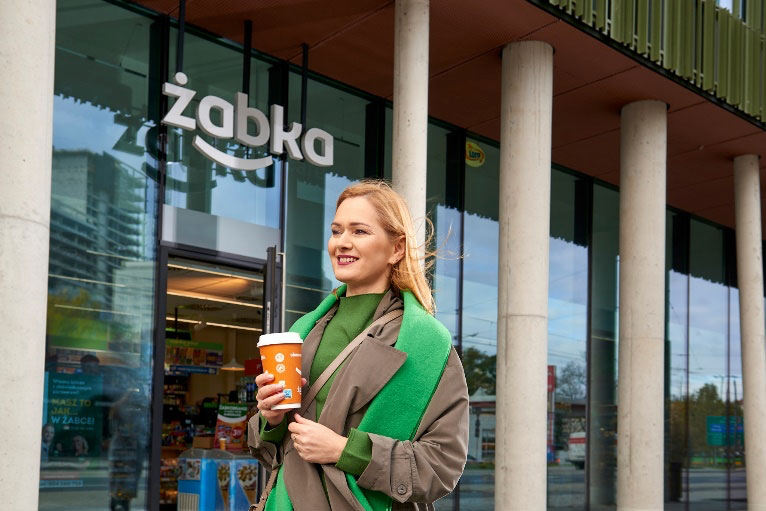
W Żabce dużą uwagę przywiązujemy do rosnących wymagań środowiskowych, a sprostanie kolejnym oczekiwaniom naszych klientów stanowi nasz priorytet. Z tą myślą podjęliśmy się ambitnego projektu, mającego na celu zmniejszenie zawartości polietylenu w naszych kubkach. To przedsięwzięcie nie byłoby możliwe bez bliskiej współpracy z naszym dostawcą, firmą Huhtamaki, liderem na rynku opakowań.
Naszym celem było nie tylko zmniejszenie ilości plastiku w obiegu, ale także zwiększenie możliwości recyklingu zużytych kubków. Te założenia wpisują się w europejskie normy dotyczące ekoprojektowania i gospodarki o obiegu zamkniętym, ale też w cele, które wyznaczyliśmy sobie w ramach naszej Strategii Odpowiedzialności Grupy Żabka.
Kubki dostępne w naszych sklepach przy kawomatach, są produkowane z papieru pokrytego warstwą polietylenu, który zapobiega przeciekaniu. Choć standardowe kubki na rynku zawierają od 10 do 15% polietylenu, dzięki otwartości firmy Huhtamaki na współpracę na rzecz innowacji oraz testy, udało nam się zredukować ten udział poniżej 5%. W efekcie, obecnie nasz kubek 200 ml zawiera 2,62% polietylenu, a kubek 400 ml - 3,0% polietylenu.
Dzięki redukcji polietylenu, nasze kubki są teraz bardziej przyjazne procesom recyklerskim, co jest kluczowe w kontekście nowych regulacji, ale też naszych własnych celów w ramach Strategii Odpowiedzialności. Co więcej, udało nam się to osiągnąć bez uszczerbku dla jakości i funkcjonalności produktu.
Naszym celem jest stałe doskonalenie się i dążenie do innowacji, a realizacja tych celów we współpracy z naszymi partnerami biznesowymi daje nam podwójną satysfakcję. Wierzymy, że dzięki takim inicjatywom, możemy aktywnie przyczyniać się do budowania lepszej przyszłości dla ludzi i planety.
Razem możemy więcej
Otrzymuj wiadomości o czystym biznesie na swoją skrzynkę odbiorczą
Zapisz się do listy newsletterowej platformy czysty biznes, aby być na bieżąco z naszymi wydarzeniami, aktualnościami i partnerstwami na rzecz zrównoważonego rozwoju.
Skontaktuj się z nami
Chętnie nawiążemy kontakt z firmami, którym zależy na budowaniu partnerstw na rzecz pozytywnej zmiany oraz wspieraniu innowacyjności w obszarze zrównoważonego rozwoju.
Witaj w fair business newsletter
Od teraz zawsze będziesz na bieżąco z naszymi działaniami, współpracami i wydarzeniami. Zainspiruj się, by razem z nami tworzyć czysty biznes!
You have unsubscribed from the newsletter list
Przykro nam, że rezygnujesz z subskrypcji fair business newsletter. Pamiętaj, że zawsze możesz odnowić subskrypcję.







